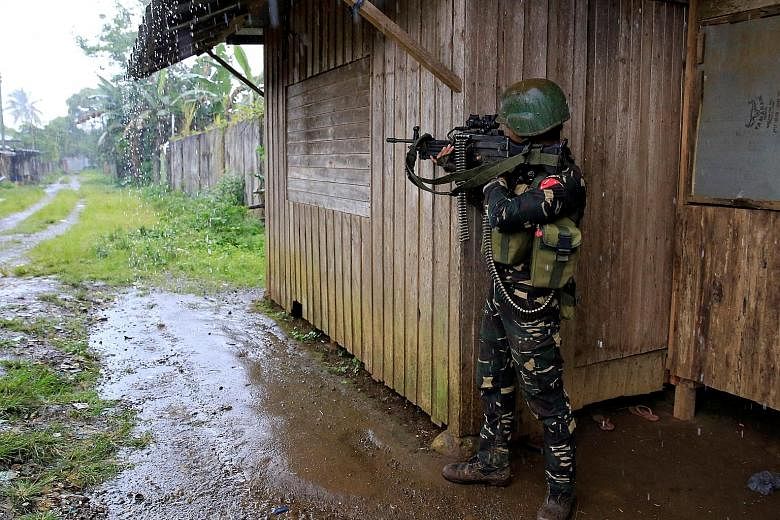Eleven soldiers died in an air strike aimed at driving out Muslim militants still holding parts of the southern Philippine city of Marawi City, as the country's biggest internal security crisis in years deepens with no end in sight yet.
Brigadier-General Restituto Padilla, the military spokesman, told reporters that an SF-160 aircraft, normally used for training pilots, missed its mark and dropped a bomb instead on ground troops trying to flush out gunmen holed up in fortified buildings.
That brought the total number of soldiers killed so far in the fighting for Marawi to 36. Three policemen and 19 civilians have also died.
The clashes began last Tuesday, after security forces tried to capture Isnilon Hapilon, head of the South-east Asia branch of the Islamic State in Iraq and Syria (ISIS).
Government troops underestimated the strength of the militants protecting him, and the raid went awry. The militants, mostly from the Maute group, took over much of Marawi, setting fire to a cathedral and a hospital and taking hostages.
Defence Secretary Delfin Lorenzana said he remained confident that the military would drive all remaining militants out of Marawi by today. Some 100 gunmen were still holed up in only "one strong point", he said.
"It's very hard to crack. It's across a bridge from city hall…The target is still there. (Friday) afternoon, let's see," said Mr Lorenzana, noting that the militants were hiding in reinforced buildings, covered by snipers. "Sometimes, our artillery shells just bounce off the roofs."
But he said 21 armoured vehicles and a third battalion of marines had been sent to dislodge the militants.
"There's only one strong pocket of resistance. If we can converge our troops, the more we won't need air strikes. We'll just let the ground troops do their thing," he said.
Mr Lorenzana said the information on Hapilon was "A1", but "what the military and police didn't know was there were already a lot of Maute and ISIS (fighters) around the city. They had a big plan to take over Marawi". He added that Hapilon used "several million dollars" from ISIS to bring in militants from his strongholds in the Sulu archipelago, while the funds were brought in by South-east Asia fighters coming home from Syria and Iraq.
President Rodrigo Duterte said yesterday that the Marawi plot "is purely ISIS". Mr Lorenzana said at least 120 militants have been killed in Marawi, including two each from Malaysia, Indonesia and Saudi Arabia, and one each from Chechnya and Yemen. Asked if they were ISIS members, he replied: "I believe so. "
Many of the 500 who joined in the fighting were trying to slip out of Marawi, blending in with fleeing civilians, he said. Those still putting up a fight were protecting Hapilon.

